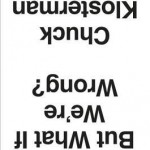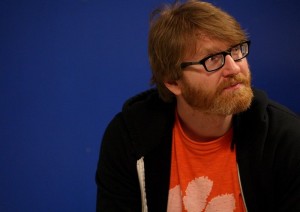[3-minute read]
If you’ve read one of these things before, you know my schtick. (It’s not so artificial, though, not really.) I’m a confirmed Accidentalist as a reader, about the farthest imaginable distance that a member of the homo sapiens tribe can be from A) a trend-watcher, eyes peeled for the New and the Hot and the Must-Read¹ or B) somebody with a plan. Usually, that means that when I get around to reading something I wish I’d read it long before. So.
¹ Cases in point: I’m still smart-phone free. I drive standard. I play vinyl records and CDs.
I’ve made no sudden conversion to Column A or Column B, but am still prone to literary accidents, which is how I ran into Chuck. Klosterman’s 2016 – wait, isn’t that THIS YEAR? – book-length thought experiment But What If We’re Wrong? Thinking About the Present As If It Were the Past. It’s my first book-length CK, though I used to read him often on the Grantland sports ‘n ‘popcult website (ah, Grantland, we hardly knew ye). The moral: it pays, in intellectual and vaguely spiritual terms, anyway, to go to the library. [That hyperlink right there was to a Neil Gaiman essay. You should go to it. And to the library.] BWIWW?, with its black text on white, upside-down cover, leaped into my sweaty palms from my local branch’s “Express Reads” shelf. Get it now, it’s hot, but you have only 7 days before library muscle is pounding on your door…²
² I should have bought it. Ended up costing me a $10 library fine.
It’s a smart and entertaining book, which concerns itself with “Big Potato” questions that cluster around the title query: how can we be so sure about nearly anything, when time so often (and often so quickly!) proves us to be out to lunch without a paddle? what can we safely predict about our futures? do we have even half-decent tools for justifying what we think we know for certain? Klosterman is stylish, contrarian and witty on such starchy questions as these³, there are any number of quote-worthy morsels, but I liked the one below. Sportsy readers don’t get nearly enough Cool Quotation time, so this one’s for them. And for you.
³ No small potatoes. Only big ones are his prey. “Starchy” questions. Get it, didja get it?

The front cover. The subtitle is on the back, right-side up, which forced me to regularly open the book from the back.
As he concludes the book, Klosterman turns his attention to sabermetrics, the growing movement to quantify and generally science-up the approach to appreciating and understanding sports, the teams and the athletes. Why care? you ask. I answer, Because there’s more to sports than just sweat and dunks, grunts and numbers, for one thing, but also because Klosterman makes reading about sports feel fresh and [gulp!] enlightening. He makes sport feel like a genuinely useful lens to understand human beings and their cultures. Bam. Tell the truth: you have to finish this piece now, right? And the quote is just around the bend.
He begins with a confession: he was a stats geek before stats geeks were cool, with their own academic conferences and, more and more commonly, the reins of professional sports clubs in their keyboard-callused hands. With little live sport to watch on TV – he’s into his 40s now, but the main reason was likely living in rural North Dakota – Klosterman’s pre-teen appetite for sports was stoked and fed by “maniacal” attention to statistics, and indignant rants on the various players that he was convinced were under-appreciated by most fans.
If you’re not a sports person, this is now not the sole province of weird and precocious mid-Western children – sports analytics has gone mainstream. Millions of (mainly) teenaged to early middle-aged men now debate sports with Excel spreadsheets and graphic analysis. “Regression to the mean” is fairly standard sports-bar phraseology these days, along with “efficiency” and a distaste for Neanderthal concepts like “leading scorer” and “batting average” or an allegedly romantic notion like the “clutch player”. Klosterman disavows, at least partly, his youthful obsession for at least one main reason: it’s just too damned SURE of itself. He argues, in much of the book, against “the modern culture of certitude” and in favour of expanding our comfort with uncertainty, even ambivalence, since life is inevitably more complex than we stubbornly wish to think.
And not only that, but we seem to be obsessed with Being Right as the ultimate value, even in the context of sports where the outcomes, from a sane perspective, don’t even carry that much weight. Isn’t it really the stories of the athletes, the narrative intangibles like courage and joy and never saying ‘die’, that make sports something worth paying attention to? Or as Chuck Klosterman frames it,

